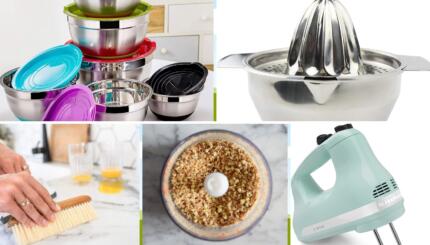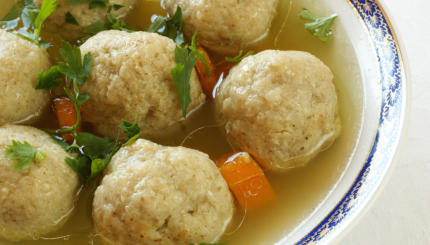Rachel Saks has an M.S. in Education and is a Registered Dietitian. She developed and ran Healthy Living, a Camp Ramah program that combines nutrition education, mindful eating, cooking instruction and physical activity. Rachel is also the co-author of “Jewish American Food Culture.”
Even though the
costumes have barely been packed away and there are still one or two lonely poppy seed hamentaschen sitting on your counter, it’s time to think about Passover. Will you be having guests for
seder
or going to celebrate with friends and family? Who will be invited? What kind of
haroset
will you make this year? What kind of medication will you stock in the medicine cabinet for the inevitable mid-week tummy troubles? All of these are important questions to answer, but it’s also important to stop for a moment to think about another, slightly bigger question: How will you engage your children in preparations for the holiday this year in a way that will bring your whole family a deeper, more spiritual understanding of Passover?
Sure, you can ask your children to help clean the house of
chametz
, but doing so won’t give them a context for understanding the holiday, primarily because it involves simply doing something rather than immersion in an experience. Jewish camps excel at experiential learning by creating a context for activities rather than going through the actions by rote. Camps deeply engage campers with Judaism at a young age, leading them to develop a desire for connectivity to the Jewish community and to the formation of a strong Jewish identity.
One of the greatest and most exciting ways for kids to experience Judaism and Passover is in the kitchen. With their hands in kugel and their minds on the laws of
kashrut
for Passover, kids have the opportunity to learn through doing on this holiday. Teach them about what it means to be kosher-for-Passover and engage them in helping to prepare your kitchen for the holiday. Work with your children to find interesting recipes and to plan, shop, and cook with them. Notice the pride they exhibit when mastering a task in the kitchen (just like the pride they had last summer when they perfected their 3-point shot or got up on water skis!) and revel in the fact that they are experiencing and understanding Passover on a whole new level.
Here are some tips to involve your children in the kitchen on Passover and the rest of the year, as well as a fun recipe to try together. Planning, shopping and cooking can teach you and your family how to effectively connect to each other, to Judaism and to God on a deeper and more meaningful level. Here’s how:
1. Plan it up!
Cooking with kids works better if they are involved in the planning and if they are given a specific job to do under light supervision.
2. Chop it up
Kids 3 years old and up can cut, as long as you give them a safe knife. Give them a plastic disposable knife, plastic knives from a kids set, or a butter or dinner knife with a dulled edge. Give them things that are easy to cut, like herbs, peeled fruit, zucchini, tomatoes and cucumbers.
3. Mix it up!
Kids love stirring and mixing things, but that doesn’t have to be limited to baking! Have them help toss a salad, mix sauce into quinoa, or even mix spices together for an herb rub.
4. Mess it up!
Cooking with kids will be messy, but that’s okay! Food will be spilled and clothes like likely get stained- so gets some aprons and let the fun begin!
5. Chat it up!
Try to use your time in the kitchen together to talk about food traditions, the spirituality of food, where food comes from, good nutrition and more. The opportunity for these precious family moments should not be missed!
for Passover Zucchini Potato
Muffins
Serves 10-12
Ingredients
5 medium baking potatoes
2 small zucchini
2 medium carrots, peeled
1 large yellow onion
5 cloves garlic
1 large spring fresh rosemary
4 whole eggs
4 egg whites
3 tablespoons olive oil
1/3 cup matzah cake meal
3 tablespoons potato starch
2 ½ teaspoons kosher salt
1 teaspoon black pepper
Instructions
- Preheat the oven to 375 degrees.
- Using the shredding blade of a food processor, shred the potatoes (with the skin), zucchini, carrots, onions and rosemary leaves.
- Place all of the vegetables in a large bowl and squeeze out the excess liquid (don’t worry about getting all of it out- there will always be more!)
- In a separate bowl, beat the eggs and then stir in the remaining ingredients.
- Pour the egg mixture over the vegetables and mix well.
- Spray muffin tins with cooking spray and heap the vegetables into the tins. Pat down firmly.
- Bake for 30 minutes, or until the kugel seems to be firm and set and the top is browned and crispy.
- Remove from oven and let rest 10 minutes before serving, or allow to cool and refrigerate up to 5 days (or freeze up to 3 months!)
Have a happy, delicious and meaningful Passover!



